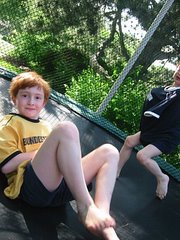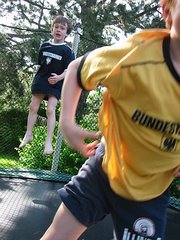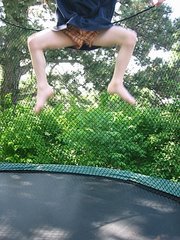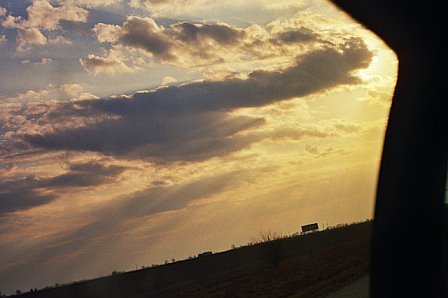Holidays 2007
As I've been mentally crafting The Letter that I write each year at this time to friends and fam, I keep thinking about a very dear friend of mine who died this year. She was in her 80s, and was one of the most joyful, sensitive people I’ve known. The last time I saw her was in a coffee shop where she was sitting with a friend. She was ill and having trouble speaking, so we sat for a minute just holding hands, smiling at each other. “How are you?” she whispered. Like always, there was so much and so little to say. I mentally started listing the things I always say…I’m fine, the boys are doing well, Martin is good…blah blah blah... But sitting there, looking into her kind, smiling eyes, I just smiled back and said, “I’m good. It’s just…life.” She didn’t say anything for a minute, then she said quietly, “And therein lies the tale.”
It was wonderful to have a friend who said things like that. And she was exactly right, too; all the tales, big and small, come from just…life, and there is always so much to be told.
Just…life has been good to us this year. Our families are well, and we are working hard at things we enjoy. The boys are 11, 9, and 2, and although at times it looks to me like the only real difference between being 2 and being a pre-adolescent 11 is that you have a more obnoxious vocabulary at 11, the boys are doing just fine. Noah says that the best thing that happened to him this year is that he made two new friends; the worst thing is that his best friend’s dad is very ill with cancer. Jacob says his most enjoyable moments were playing at the Indoo (a fabulous indoor playground in Hamburg) and getting a spare while bowling in NJ with Nana and Grandpa. And I guess Gabriel would say that the highlight of his year has been going from being mostly horizontal to mostly vertical.
For me the most memorable moment is one from our time in Germany. For reasons that I still cannot understand, the five of us ended up on our last day in a large wooded park that had something akin to a “high ropes course” (imagine dangling from steel cables strung between trees about 40 feet off the ground, forced to navigate in torturous ways from one tree to the next, i.e. walking on uneven wobbly boards, climbing through a giant spider web, balancing on a moving plank, etc.). Jacob, who is as agile as a squirrel, was desperate to try it, and since he wasn’t old enough to go it alone, I agreed to do it with him. I’ll spare you the horrific details; I will just say that while my 50-pound son had no trouble skittering across the ropes from one flimsy tree platform to the next, I, who had eaten my way through three weeks of family festivities, and am also terrified of heights, did not fare as well.
The lowest point came when I got stuck in a large wooden bucket, suspended on a cable between two trees, with neither the emotional fortitude nor the upper body strength to carry on. I hung there for so long, panicking, that a small group of British tourists actually gathered below me and shouted encouraging comments, but it did not help. It was while I was yelling down to Martin that I could not move—ever again—and to please find some way to get me down, when I heard Jacob calling to me from his perch on the tree I was trying to reach: “You can do it, Mama! Just a few more feet! Pull, pull!” His sweet voice and earnest confidence made me realize, suddenly and viscerally, that I needed him as much as he needed me, and not just at that moment, but always. (I did make it to the next tree, but told him that we had to take the next short cut back down. He was pretty understanding about it at the time, but later he said to me, “Oma would have finished the whole thing.” And, knowing my formidable mother-in-law, who jumped out of a plane at the age of 65, I had to agree).
The thing was, that was a big moment because it meant that somewhere along the line my boys have stopped being tiny beings who need endless care, and started being people who go about in the world with much to offer. This has probably been long obvious to anyone but me, but when you are stuck in what Martin calls “the tunnels” of family responsibilities and work responsibilities, all you can see is whatever duty is right in front of you. Do laundry, make lunch, pay bills, yell at someone about their homework, make dinner, do more laundry, clean the bathroom, read a story, sing “Wheels on the Bus,” drive to school and on and on. But of course, they—we—are so much more than those things. I see that when Noah asks us if we had a good day, when Gabe comes and gives us hugs. I see it when Jacob offered me “German lessons” (30 minutes each Sunday), which I hope is more a reflection of his good nature and less of his pity for my poor language skills. I try to remember it at the times when all I hear are their assorted lamentations. And I think of it when I read this quote from Garrison Keillor: “Nothing you do for children is ever wasted. They seem not to notice us, hovering, averting our eyes, and they seldom offer thanks, but what we do for them is never wasted.”
I’ll close with another line from Garrison Keillor, who is without question one of the greatest American writers of all time: “Thank you, God, for this good life, and forgive us if we do not love it enough.”






















